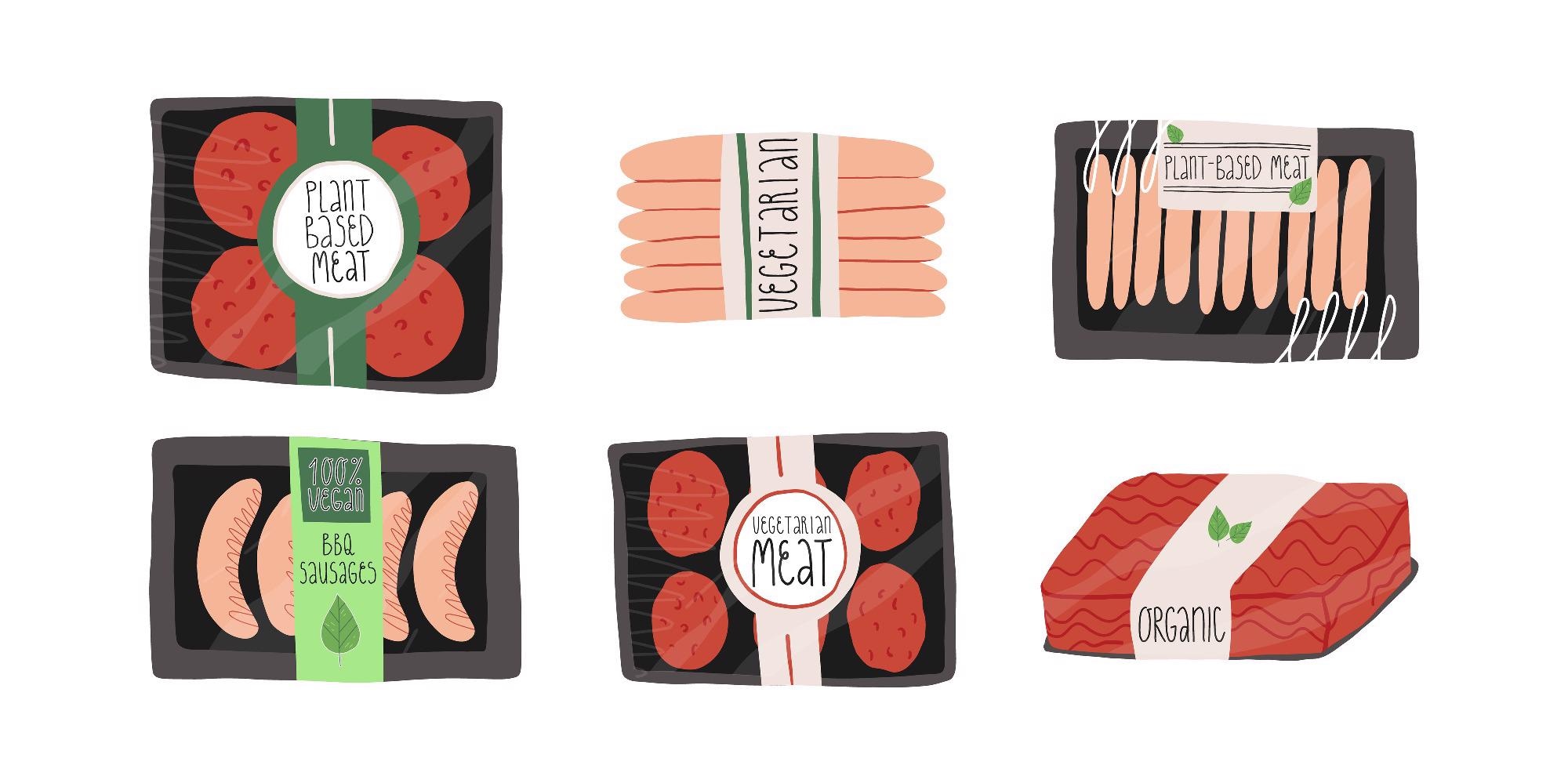What are the Health Effects of Ultra-Processed Vegan Foods?
Veganism has increased in popularity and exposure in the northern hemisphere, particularly among millennials. The prevalence of vegans in Europe is estimated to be 1-10 %; however, the true prevalence of veganism is unclear and varies substantially across the world.

Meat-free sausages. Image Credit: DronG/Shutterstock.com
While several studies have shown the beneficial effect of a vegan diet on human health, due to increased consumption of vegetables, fruits, nuts, cereal grains, legumes, and seeds, the increased prevalence of vegan junk food poses a risk of imbalanced nutritional intake.
Recent developments in the food industry have enabled new plant-based meats and dairy substitutes to be created; Among them, a proportion of those are classified as ultra-processed foods. The constituents of ultra-processed foods include additives such as texturizers, dyes, and emulsifiers.
This increased availability of plant-based food alternatives for both vegetarians and vegans is thought to aid dietary planning; though little information is known about the effect of these ultra-processed foods, particularly regarding their nutritional quality and functional effects.
What are ultra-processed foods?
Ultra-processed foods are defined as formulations of substances that are taken from foods (the three major macronutrients starches, fats, and protein isolates) combined with flavors, colors, emulsifiers, and other cosmetic additives. The true definition of the term ultra-processed foods is contested; however, these products have characteristic features which include high energy density, high sodium content, high fat and free sugar content, and poor in vitamins and minerals as well as dietary fiber.
Ultra-processed foods are commonly marketed as healthy, as they fall under the vegan label. These ultra-processed foods fall under the NOVA classification system. The Nova classification was produced in 2014 by Brazil, the first country in the world to release dietary guidelines based on the degree of food processing.
In this system minimally own processed foods were distinguished from processed foods and ultra-processed foods in what is termed as NOVA (‘new’ in Portuguese).
Does the average vegan diet cause negative consequences on health?
Research from the Nutritional Epidemiology Research Team (EREN-CRESS, Inserm, INRAE, Cnam, Université Sorbonne Paris Nord) analyzed the daily food intakes of 9812 meat eaters, 646 vegetarians, 500 vegetarians, and 254 vegans. The nutritional quality across these diets was assessed by healthy and unhealthy plant-based indices alongside definitive descriptions of these foodstuffs.
Among the four groups, the team found that higher avoidance of animal-based foods was correlated with increased consumption of ultra-processed foods, comprising 39.5% of the energy intake for vegans (33% for meat-eaters, 32.5% for pesco-vegetarians, and 37% for vegetarians). However, when assessing nutritional quality, results demonstrated that this was increased with the level of animal-based food avoidance, with vegans consuming the greatest nutritional quality among the four groups (an index of 67.9; ask compared to 53.5, 60.6, on 61.3 for meat-eaters, pescetarians, and vegetarians, respectively).
This study demonstrated that vegans, vegetarians, and pescetarians consumed greater quantities of both healthy and unhealthy plant-based products; highlighting the heterogeneity in vegetarian and vegan diets. Those consuming a greater proportion of processed forms of plant-based foods are unlikely to benefit from the health benefits attributed to non-processed plant-based foods.
The researchers noted, however, that a greater understanding of plant-based foods, their degree of processing, nutritional profile, and adequacy of meal patterns is needed.
Not all substitutes for non-vegan foods such as meat and dairy are ultra-processed. However, it has been noted that public and academic research into the effects of the increasingly mainstream products is lacking. This is concerning as consumption of these ultra-processed foods is likely to lead to poor health outcomes, which include being overweight, obesity, cancer, cardiovascular disease, type 2 diabetes, and cardiometabolic risks.
This is because there is already an established body of evidence that has linked poor health with frequent consumption of ultra-processed food; however, little is known about the consumption of these foods in the vegan context.
Some evidence suggests that there is variation in the nutritional content of meat substitutes, as compared to their non-vegan counterparts. As is the case with processed meats, products like plant-based sausages can also contain a high concentration of saturated fat, salt, and/or free sugars.

Meat-free alternatives. Image Credit: Katya_Sever/Shutterstock.com
The association between vegan junk food and the risk of chronic disease and mortality
Although the understanding of ultra-processed foods, especially in the vegan context, is lacking, > 20 studies have been published since the release of the NOVA classification. Despite the heterogeneity of epidemiological studies published on ultra-processed foods, the scientific evidence consistently describes their potential detrimental health effects.
The following list demonstrates the potential health outcomes as a result of consuming ultra-processed foods:
- Excess weight and obesity
- Metabolic syndrome
- Hypertension
- High levels of triglycerides and low density lipoprotein (hyperlipidemia).
- Increased risk of cardiovascular disease
- Increase risk of overall cancer, and particularly colorectal and prostate cancers
- Increased risk of developing gastrointestinal disorders such as irritable bowel syndrome, functional dyspepsia, constipation, and diarrhea
- Asthma and wheezing
- Increased risk of overall mortality
Nutritional deficiencies caused by the consumption of vegan junk food
Plant-based alternatives tend to lack essential nutrients. For example, tofu is a good source of omega-3, however, this form of omega-3, alpha-linolenic acid, must be converted to eicosapentaenoic acid (EPA) or docosahexaenoic acid (DHA) to produce a functional effect. However, the body is poorly equipped to convert ALA into these functional compounds.
Moreover, plant-based protein sources tend to lack a complete profile of essential macronutrients. Most commonly, they are deficient in one of the nine essential amino acids, which requires balancing proteins for the complementation of amino acids.
Alternatively, supplementations are necessary. Moreover, vegan junk foods do not contain heme, derived from blood. Non-heme iron, which is present in vegan foods is poorly absorbed, increasing the risk of anemia among vegans. In a meta-analysis of iron deficiency among vegetarians, vegans, and omnivores, vegan women, in particular, were found to be the highest risk group of developing such iron deficiency.
Overall, there is an understated health risk associated with the overconsumption of vegan junk food. There is a false equivalence between the label of vegan and the expectation of nutritional balance. In the case of vegan junk foods, and increased use of sugars, saturated fats, starches, additives, which include emulsifiers colorings, and stabilizers, subsequently increase the risk of poor health outcomes associated with the use of these foodstuffs.
Ultimately, whole-food plant-based diets are considered to be beneficial to health, rather than those vegan diets which contain high levels of ultra-processed foods.
References
- Gallagher CT, Hanley P, Lane KE. (2021) Pattern analysis of vegan eating reveals healthy and unhealthy patterns within the vegan diet. Public Health Nutr. doi:10.1017/S136898002100197X.
- Pawlak R, Berger J, Hines I. (2016) Iron Status of Vegetarian Adults: A Review of Literature. Am J Lifestyle Med. doi:10.1177/1559827616682933.
- Gehring J, Touvier M, Baudry J, et al. (2021) Consumption of Ultra-Processed Foods by Pesco-Vegetarians, Vegetarians, and Vegans: Associations with Duration and Age at Diet Initiation. J Nutr. doi:10.1093/jn/nxaa196.
- Srour B, Fezeu LK, Kesse-Guyot E, et al. (2019) Ultra-processed food intake and risk of cardiovascular disease: prospective cohort study (NutriNet-Santé). BMJ. doi:10.1136/bmj.l1451.
- Rico-Campà A, Martínez-González MA, Alvarez-Alvarez I, et al. (2019) Association between consumption of ultra-processed foods and all-cause mortality: SUN prospective cohort study. BMJ. doi:10.1136/bmj.l1949.
Further Reading
- All Vegan Content
- Should Vegans Take Supplements?
- What are the Health Benefits of a Vegan Diet?
- The Vegan Diet, Ethos, Affects and Advice
Last Updated: Feb 14, 2022

Written by
Hidaya Aliouche
Hidaya is a science communications enthusiast who has recently graduated and is embarking on a career in the science and medical copywriting. She has a B.Sc. in Biochemistry from The University of Manchester. She is passionate about writing and is particularly interested in microbiology, immunology, and biochemistry.
Source: Read Full Article
